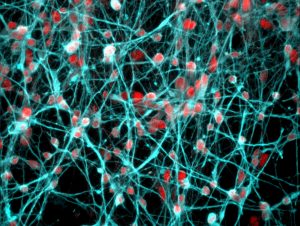
A magnified image of developing young human neurons. The mineralocorticoid receptor, coloured red, was found in the cell nucleus of these neurons.
Following a stressful event, glucocorticoid (GC) hormones are secreted into the blood and act on the brain where they allow for active coping and adaptation to the stressor, for example through learning and memory processes. Additionally, GCs are secreted in a circadian pattern in which they peak prior to your active period. To carry out their action these hormones bind to two receptors, the mineralocorticoid receptor (MR) and glucocorticoid receptor (GR). MRs and GRs are both found in an area of the brain called the hippocampus, a region which plays an important role in learning, memory, and stress regulation. Once GCs bind to these receptors, they interact with recognition sites within the DNA to influence gene activity. It is important to understand the action of these receptors as GC dysregulation has been identified in patients with mental health disorders such as depression. Currently, however, the known targets of these GC receptors are limited. Therefore, our research aimed to uncover MR and GR interaction sites across the entire hippocampal genome during both the circadian fluctuation and following acute stress and to assess the gene transcriptional consequences of these interactions.
Our work, published in Nature Communications used state-of-the-art chromatin immuno-precipitation (ChIP) and RNA analyses in combination with next-generation deep sequencing techniques to identify novel targets of MRs and GRs. It was found that many of the discovered genes are involved in neuroplasticity processes (e.g. LTP, LTD, neurogenesis, etc.), processes known to underpin learning and memory. Furthermore, our research also revealed a previously unknown link between MR and cilia, which are small protrusions from cell bodies involved in neuronal differentiation and brain development. This discovery is exciting as it implicates a role for the MR and cilia in cognitive development, and potentially even in mental health and developmental disorders. Overall, these results are fundamental for the further understanding of GC receptor action and, by using this information, future investigations can determine how disruption of this process is involved in stress-related mental health and other disorders.
Contributed by Samantha Haque and Emily Price, Neuro-Epigenetics Research Group, UoB, SWBio DTP students
Read the full press release >>


Paper: Distinct regulation of hippocampal neuroplasticity and ciliary genes by corticosteroid receptors by Karen R. Mifsud, Clare L. M. Kennedy, Silvia Salatino, Eshita Sharma, Emily M. Price, Samantha N. Haque, Andriana Gialeli, Hannah M. Goss, Polina E. Panchenko, John Broxholme, Simon Engledow, Helen Lockstone, Oscar Cordero Llana & Johannes M. H. M. Reul in Nature Communications
